
2010: MY YEAR IN FILM
christopher funderburg
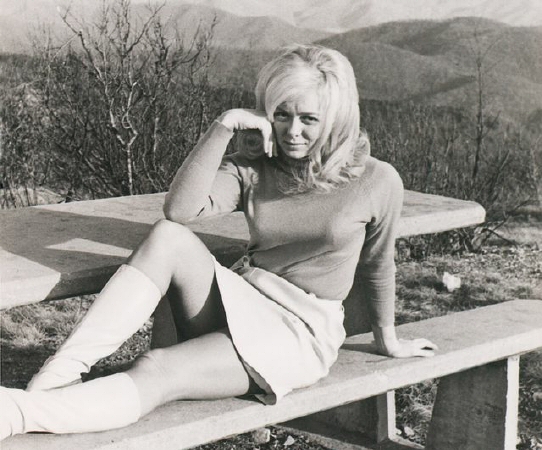
I feel a little strange doing my annual "year in review" article this year. Previously, even if I didn't necessarily have confidence in the value of my opinions, I at least knew that I'd seen practically every movie worth mentioning in any given year - my comments had the inarguable value of "quantity" behind them. But in 2010, I ended up a married man with a little infant boy and, as that life-situation invariably dictates, I had to reassign a huge chunk of time to these new responsibilities, namely the time that would have been spent going to see movies like The A-Team and The Runaways. Sure, I still saw more movies than most folks, but I disposed of the most disposable segment of my movie-going life: the films I go to see simply because I like going to movies, not because I think they will actually be any good. When Serious Adult Responsibility imposes its force on your life, why is it that Pure Unadulterated Pleasure is always the first casualty? Why couldn't I have just spent less time standing around in the pharmacy waiting to pick up some marginally useful medication or less time putting up new drapes? How did my free-time time become arranged in such a way that I had practically no choice but to watch Million Dollar Money Drop's hour-long debut on the Fox Television Network, but couldn't get out to see The Fighter? Heck, I even tried doing something like watching Claire Denis' The Intruder on dvd with my patient and quiet son Parker, but the opening credits freaked him out and sent him on a rare and unsettling crying jag. To be part of a family, you have to give up a little of yourself. It's just the way it is. Knight and Day and The Girl who Kicked At Hornet's Nests don't have a place in my life anymore. Not a secure place, at any rate. Maybe even more importantly, there are many serious artworks passionately championed by critics that I skipped because my chances of liking them seem pretty low: films like Somewhere or Certified Copy will be perpetually back-burnered when I am (at most) seeing only one movie a week in the theater. That unfortunately means that I've missed a couple films for which my skepticism would be proven unwarranted: I never liked Michel Gondry but found that I loved The Science of Sleep - would Sophia Coppola's latest have snuck up on me just as unexpectedly? I do love Stephen Dorff. And I haven't even mentioned the films I missed that I'm fairly certain I would enjoy like Toy Story 3 or poorly-reviewed films that I could easily see myself getting behind like How Do You Know. Also, I was unable to verify John Cribbs and Paul Cooney's outrageous claim that MacGruber is actually good.
So, who am I to judge? Well, I've never meant for these lists to be "The Best Films of the Year." These are just my favorite films of the year, the ones that I enjoyed the most or that somehow otherwise hit me right in the ol' magoo. I think rating films along an ordinal continuum from best to worst is a load of horseshit, anyway. As if there's some coherent method for weighing Carlos against Easy A or Harry Potter Part 7, Part 1. The King's Speech vs. Film Socialisme? Clearly one is the 38th best film of the year and one is the 42nd best. I'm sure the writers of these #1 through #10 lists would tell me to relax, it's just a conversation starter. They are indeed correct: saying something profoundly stupid in your capacities as a noted authority will start some conversations. Why not just fess up and admit the films can't be rated good, better, best and write with no compunction about the personal nature of it? Beyond that, I'm sure some of you have noticed that I write about films according to when I saw them, meaning my 2009 list features White Material and Soul Kitchen, two movies popping up on a few "Best of 2010" lists. In keeping with the idea that these lists are personal, I see no reason to arrange my work according to the marketing plans of giant conglomerates and wait several months (or years) after I've seen a film for a distributor IFC or Magnolia to do a cursory theatrical release followed by a direct-to-home-viewing dump before I discuss something I loved. I don't care about waiting for a movie's SAG award eligibility period or give a shit about contributing to Oscar buzz. I know some folks prefer to see a movie before they read about it, but I've always aspired to the level of Terrence Rafferty's review of Touchez Pas au Grisbi, the first review I can remember reading before I saw a movie and having it hugely enrich my viewing experience. I can't fault anyone for skipping my Tabloid or SUPER write-ups, but that's the nice thing about writing for a website with zero financial aspirations: I don't have to take the audience into account. Honestly, though, who knows when either of those films will come out and in what capacity? Is it better to read about them now or 8 months after they're dumped onto cable with no fanfare? Anyway, this shebang is about the experiences I had with film over the last 12 months and I genuinely hope you get something out of it, charmless iconoclasm and all. (My failure to have The Expendables, notwithstanding. There's just no excuse for that.)
So, here it is, same as it ever was, my favorite films, some memorable moments and other notable nonsense from my year in film, 2010.
MY FAVORITES
ANOTHER YEAR.
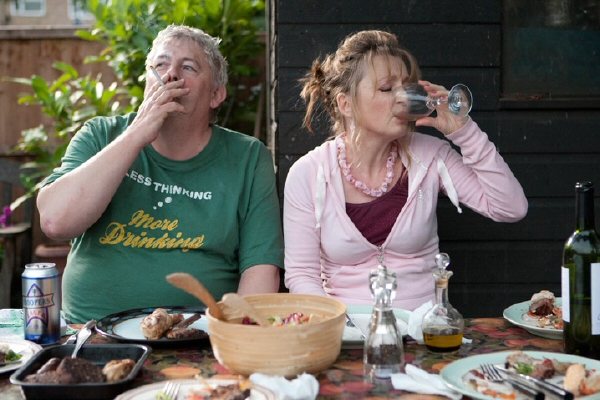
Despite an inscrutable and seemingly chaotic development process, steady themes have emerged in the work of British director Mike Leigh. A creative process that involves a heavy amount of early improvisation designed to lead his work towards unpredictable outcomes and rich imitation of life's natural anarchy wouldn't seem ideal for fostering consistent thematic concerns, but with Leigh's work, there you have it. Since at least his conclusive jump from teleplays to theatrical releases with 1988's High Hopes (and its immediate predecessor, The Short & Curlies), Leigh has explored over and over the crucial mystery of life: why are some people happy and some people miserable? It's a simple question commonly afforded easy answers, but Leigh's value - and, in fact, the value of his creative process - comes from explicating just how truly mysterious this question is. If only the answer were as simple as "be a good person" or "make the right decisions" or "do the things that you think will make you happy" or, worst of all, "take responsibility for your life." If only the answers were that simple, Mike Leigh's films could scarcely exist. Instead, through his extensive months-long development of characters and situations in tandem with his actors, Leigh hashes out just how much conflict and confusion there is to be found in the essential question of human happiness, just how much our life stories do or do not lead us to predictable ends, how much control we have over ourselves and world, how much we contribute to our own happiness or fail to understand the ways in which we cannot contribute to it. From there, a natural set of secondary themes occur: what if, for instance, you are Lesley Manville's harried and hapless crux of Another Year, Mary, and have some dim awareness that you are the source of your own problems, some dim awareness that grows more powerful with each new set of humiliations and flops? If you are the source of your own problems, what can you do? How can you not be yourself? What if, as Imelda Staunton's bitter insomniac, you rate your happiness a 1 out of 10? Is her answer to the question of what would improve her life not the correct answer: a different life?
Another Year's over-arcing plot follows the aforementioned Mary and her relationship to the unflappably even-keeled and effortlessly harmonious couple, Tom and Gerry (Jim Broadbent and Ruth Sheen, respectively.) Mary the secretary, with her parking tickets, ex-husbands and sloppy drunkenness, pointedly contrasts with the serene couple and their love-at-first-sight-on-the-first-day-of-university-meet-cute, their satisfying careers as a geologist and a therapist, their allotment of organic produce, their arrabiata sauces. The loose flow of the movie traces the increasing strain of their friendship which reaches a breaking-point when Mary treats their son Joe's new girlfriend with seething passive-aggression. As with most Leigh films, many reviewers have been frustrated and confused by his unwillingness to stick to the "main" story and most complaints about Another Year focus on the fact that Leigh won't steer the film where it seems to be headed. Instead, divided up into four sections corresponding with the four seasons, the film presents a different "side" character in each segment and uses that character as a springboard towards unexpected tangents. That each side character appears only glancingly in any other seasonal section (glancingly at most - 3 of the 4 appear in their section alone) is obviously not a mistake: it's a film woven around 4 characters in 4 seasons, with the over-arcing story tying the unrelated folks together. In spring, we get Imelda Staunton's insomniac, who comes to Gerry hoping to simply be prescribed sleep medication. Summer brings a weekend visit from Tom's childhood friend, the drunken oaf Ken (played by Joe Wright.) Fall: the new girlfriend (and the showdown with Mary.) Winter: Tom's catatonic brother Ronnie (and as an added bonus, the explosive ball of rage known as his son Carl.) This is a film about Staunton's insomniac, drunken Ken, the gabby girlfriend Katie (Karina Fernandez) and the newly widowed, living corpse named Ronnie. It's about what Tom and Gerry can or should do to help these people, how folks get lost to themselves, the contrast between people who feel comfortable in their own skin and those who struggle to be a part of their own lives. It's about the possibility that both happiness and unhappiness are intractable. It's the about the limits and meaning of generosity.
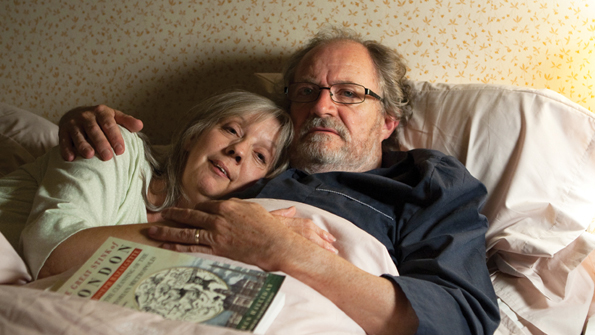 Your reaction to the film will be heavily tempered by the question of with whom you identify. The natural inclination for most audience members (of any audience likely to see a 2 hour and 10 minute free-form art-film import) will be to see themselves in the socially conscious, educated-class Tom and Gerry: it will be the story of their patience being
put to the test by a somewhat annoying acquaintance with boundary issues. The film is the story of the limits and failures of generosity, the uncomfortable truth that even a couple of warm-hearted and thoughtful good people won't be able to do anything for such a wreck. The crux of the film becomes what, if anything, decent people can do in their own small ways to make the world a better place, especially for those around them that they care about - oafish drunks and catatonic brothers alike. If,
however, you are among those of us who struggle with parking tickets and messy love-lives, maybe you have one too many to drink or have slowly become the oldest person at the pub, maybe you want to watch soccer and argue loudly not check out geological formations on cliffside beaches and tend to tomatoes, if you are like Mary or Ken or me, then the film becomes the story of the natural cruelty and arrogance of "good people" who in reality have very little to show for their goodness beyond
a sense of self-satisfaction. The difference between people like Ken and Tom is not class: Ken is an economically comfortable "graduate" with more than enough money on which to retire and take extended vacations. Nor it is an issue of open-heartedness and feeling: even Gerry can see that Mary is capable of incredible kindness and few human beings are as lovable as big, gentle lugs like Ken. It's not family background or the environment in which they are - the same family can produce erudite achiever Tom
and "right mean bastard" Ronnie. And if the process of therapy to which Gerry has devoted her life is the answer, why is her directive to every problem case who passes in front of her the same: take responsibility for your life. Take responsibility?! As if I meant to get three flats tires in a week or leave the grocery bag in the car. As if want to sweat while I eat or fall in love with married men. As if I want to stay awake night after night or consciously engineered my son to
be an explosive mass of scathing aggression. What if I don't want to go hiking in Ireland and don't care about the components of soil in London? What if vacation in Spain on the beach sounds like a nightmare to me? How can I be the person am I not? How can I be anyone but myself?
Your reaction to the film will be heavily tempered by the question of with whom you identify. The natural inclination for most audience members (of any audience likely to see a 2 hour and 10 minute free-form art-film import) will be to see themselves in the socially conscious, educated-class Tom and Gerry: it will be the story of their patience being
put to the test by a somewhat annoying acquaintance with boundary issues. The film is the story of the limits and failures of generosity, the uncomfortable truth that even a couple of warm-hearted and thoughtful good people won't be able to do anything for such a wreck. The crux of the film becomes what, if anything, decent people can do in their own small ways to make the world a better place, especially for those around them that they care about - oafish drunks and catatonic brothers alike. If,
however, you are among those of us who struggle with parking tickets and messy love-lives, maybe you have one too many to drink or have slowly become the oldest person at the pub, maybe you want to watch soccer and argue loudly not check out geological formations on cliffside beaches and tend to tomatoes, if you are like Mary or Ken or me, then the film becomes the story of the natural cruelty and arrogance of "good people" who in reality have very little to show for their goodness beyond
a sense of self-satisfaction. The difference between people like Ken and Tom is not class: Ken is an economically comfortable "graduate" with more than enough money on which to retire and take extended vacations. Nor it is an issue of open-heartedness and feeling: even Gerry can see that Mary is capable of incredible kindness and few human beings are as lovable as big, gentle lugs like Ken. It's not family background or the environment in which they are - the same family can produce erudite achiever Tom
and "right mean bastard" Ronnie. And if the process of therapy to which Gerry has devoted her life is the answer, why is her directive to every problem case who passes in front of her the same: take responsibility for your life. Take responsibility?! As if I meant to get three flats tires in a week or leave the grocery bag in the car. As if want to sweat while I eat or fall in love with married men. As if I want to stay awake night after night or consciously engineered my son to
be an explosive mass of scathing aggression. What if I don't want to go hiking in Ireland and don't care about the components of soil in London? What if vacation in Spain on the beach sounds like a nightmare to me? How can I be the person am I not? How can I be anyone but myself?
When Gerry and Tom and Katie and Joe snicker behind the back of Mary or make dismissive jokes at her expense, it's very hard not for me to react with anger. I find it telling that one of the few details to have emerged from the behind-the-scenes process of the film is that Manville complained to Leigh "Gerry is being very cruel to Mary" and Leigh replied "No comment." Of course, Mary's desperate, of course she's needy - a life rated 1 out of 10 on the happiness scale is a desperate situation and she needs Gerry's help! In a more calm mood, I can see the happy couple's point of view: Mary's a wreck and needs to be kept at bay. And what do I expect them to do for set-in-their-ways types like Ken and Ronnie floating aimlessly out of middle-age with only a long line of bleak moments on the horizon? Set them up with "the right people?" Even Ken knows that's a joke. Navigating the thicket of existential issues of any Leigh film is difficult. Fortunately. The film leaves us with "the problem of Mary" wholly unresolved: the look on her face during the final dinner scene, as the happy family gabs about their globe-trotting adventures, gives us only a sense of her growing awareness that she is the problem. The only flaw which Mary seems to address is a lack of self-awareness, her other problems of emotional fragility and proclivity for faulty decision-making firmly intact even in the final scenes. But what good could this awareness possibly do her? Is it even a change? Does her early drunken lament "why do I always choose wrong?" not mean that the look of defeat and helplessness on her face during that final dinner was hidden inside her all along? We know that she has imitated Gerry and Tom, their allotment and their cooking and failed in the past. We know she cannot gain access to their familial harmony through an ill-conceived relationship with their son. She does not have the academic talents for a late-career switch to geology or therapy. Her car was already towed, so there is no vacation in Brighton in the offing, no money to travel to Ireland and look at the beaches and the cliffs. If her apprantes at assiduous insinuation into the world of the clearest happiness she knows haven't worked what then? It is easy to imagine her behaving herself, keeping to a decorous arm's length from the happy family. Maybe she gets counseling and lays off the wine. Maybe she lowers her standards and allows an equally damaged person like Ken or Ronnie into her life. Where is she then? A harried dry-drunk secretary additionally burdened with a mean bastard or a drunken oaf. How much would she rate her happiness on a scale out of 10? At a 3? 4?
TABLOID.

Few films make me as happy just thinking about them as all-time super-genius Errol Morris' newest feature documentary, the bottomlessly twist-riddled story of a genuinely crazy fairy-tale-enthusiast/Mormon-abductor/sex-criminal/dog-attack-victim. I just think about the word "mini-bar" and laugh to myself and do really embarrassing little fist-pumping gestures. "What the hell is he talking about," is probably what you are asking yourself and I'll bluntly advise you to stop reading and just see the damn movie before you read any further. If you see the film and you don't love it, I'm sorry but we can't be friends. In fact, the sight of you will probably make me a little sick - in an "I pity you, but you disgust me" sort of way. The initial wave of reviews (mine included) have described the film as a jumbo-sized episode of Morris' "First Person" t.v. series, but I think that's not giving the film nearly enough credit especially having recently re-watching "First Person's" entire run. Given more time to stew about, I'm convinced that Tabloid is Morris' best film. It combines the lurid true crime kick of The Thin Blue Line with an examination of powerful self-deception akin to the one in The Fog of War, the homegrown eccentricity of Gates of Heaven and Vernon Florida with the laser-precise analysis of media and public perception that Standard Operating Procedure set up (but failed to knock down.) And it's fun. So much fun. Morris' films have been getting increasingly heavy, their focus on subjects like the U.S.'s fire-bombing of Japan during W.W.II and prisoner abuse in Iraq. You'd have to go back to at least Fast, Cheap and Out of Control to find a Morris film with such an energizing and inviting sense of humor, maybe even to Vernon Florida. Forget Will Ferrell and Zack Galifianakis, the best time I had at the movies last year (by a fucking mile) was at Tabloid. At a glance, it might seem like Morris has scaled back his ambition and engaged in some very winning goofing off, but really this film has everything you could ask for from the grump and the omnipresence of his lightning wit (subdued in recent years) imbues the film with a lunatic joyousness. It's not every filmmaker that can make the intersection of felony kidnapping, sleazy pornography and dog-cloning into a triumphant crowd-pleaser á la The King's Speech.
What Morris is after, as always, is pulling apart the ways in which we (particularly the most deluded we's) attempt to mediate our relationship to reality. In discovering the various ways in which individuals attempt to control the world around them through the influence of perception and the explication of inner mental states, Morris decisively refutes the sophistries "there's no objective reality" and "the world is constructed internally from a subjective vantage point." In the words of Morris, "tell someone on death row for a crime they didn't commit that there's no such thing as objective reality." In Tabloid, Morris wades deeper into these issues and reveals the irony that even sensationalized accounts of reality have the unintended run-off of shining light on factual, verifiable reality. When subject Joyce McKinney spins a web of self-serving "subjective truths" and the ravenous British tabloid press digs into her every dark secret (overplaying the conflicts in her accounts and the seedy rumors and dank details of what they have uncovered) the vomitous mess of half-truths, equivocation and transparent lies somehow brings us closer to the truth. The amusing irony is that lies are one of the many conduits to the truth - think of it in the context of another quote from Morris: "Good documentaries should make you question, rather than slavishly accept, their veracity." With Tabloid, Morris perversely sets out to use the documentary form to tell us a series of untruths, using the "non-fiction" medium to present a series of elaborate fictions: Joyce McKinney's own account of her strange and unpredictable life is true only in the sense that she said it; Tabloid is a factually accurate account of lies, the true story of untrue stories. We may never know what happened when McKinney flew to England with a gun in hand to see her ex-fiancée, but whatever McKinney tells us, we at least know that we don't know what happened: we have reached the Rumsfeldian "known unknowns" that have obsessed Morris in his recent New York Times articles. In that, Morris explicates to us that there is truth to be culled from lies, some of the most solid truths around even. Morris recently wrote, "The goal. Making a movie with simplicity of style and complexity of content. (Fat chance of achieving it.)" Of course, his grumpiness is all somewhat an act, masking a significant self-possession. I'm sure he knows he just achieved his goal.
DOGTOOTH.
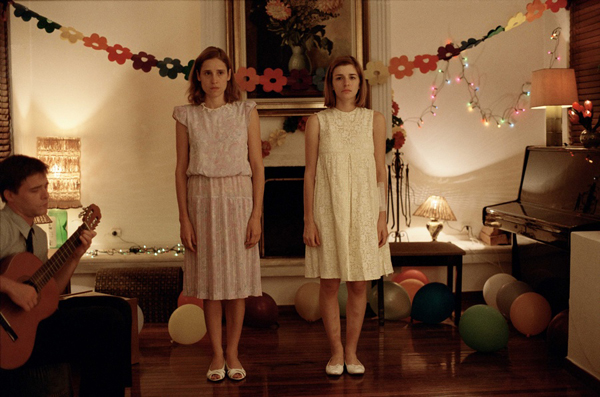
Greek director Giorgis Lanthimos' break-through feature is almost invariably described in terms that sound off-putting while completely failing to give its potential audience a clear idea of just what it actually is. For instance, every review mentions that one of the ways in which the cloistered children of an upper-class businessman are shielded from the world outside their gated property is by being told by their parents false meanings to words (e.g. "zombie" = a small flower in the yard.) This universal review-tic is frustrating because the false word scenario is a) a very small, relatively unimportant detail b) extremely confusing unless you have seen the film already. That Dogtooth is a Lanthimos' first feature to achieve notoriety in the U.S. only adds to the problem: it's a wholly original work from a director without a familiar body of work to provide any reference. Employing any of the broad keywords that could be applied to the film ("shocking violence" or "graphic Euro art-porn") leads to the double failure evoking unpleasant connotations and inexact reductivity: even positive reviews have the unintended effect of jamming something beautiful and strange into constrictive and not particularly accurate little categories. The film could best be described as a deadpan comedy, but even that is severely wanting: Dogtooth has an emotional intensity and richness more associated with Mike Leigh character studies than movies featuring hilarious Flashdance-referencing dance sequences. What if I told you that that Dogtooth is a more realistic version of The Village, would that make you want to see it? Did I mention that there are extended scenes of incest and cat mutilation? Or was that just a given once I said it was a comedy?
Whatever I write now about Lanthimos' brilliant little curio, I'm probably not going to convince you of its deft mix of combustible elements that is somehow comedic in the elements that sound disturbing and disturbing in its elements that sound most pedestrian. Beautiful, sad, funny, creepy, surprising, touching, shocking, clever: every one of these words in equal measure and none in conflict with another. The story of businessman and his wife and the implications of their decisions to raise their three children (one son, two daughters - should I even mention the one possibly imaginary, possibly real son/brother that we never see?) completely cut-off from the outside world. The film unfolds slowly, never explaining the situation, letting the minutiae and protocol of the heavily mediated homelife seep in from the edges until it overwhelms every gesture, word and frame of the film. The parents never explain their decision, we are afforded no speeches about the sanctity of family, moral purity or any other justifying philosophy apart from the immediately apparent reality of parental over-protectiveness gone completely bonkers. A great deal of the film's effectiveness lies in its savvy grotesqueries of behaviors of which every single parent on the planet can be found guilty: the little white lies used to gloss over difficult subjects, the desire to protect your children from the cruelties outside your doorstep, the exaggerated cautionary tales and poorly considered punishments, the curiosity about (and mediation of) their sexuality (a force which will invariably rage beyond your control.) It is a world of harmless backyard games with silly rules, inexperienced charges shielded from unseen and perhaps overstated forces of darkness, children caught in transparent lies and the sly ones that slip beyond your grasp and somehow get into all the things you have hidden.
The inevitable failure to mold your own flesh and blood into exactly the person you want them to be. The parental noose that hangs father and child alike. Escaping into a world beyond your parents' control. The moment when your dogtooth passes and you can step beyond the gates.
THE ILLUSIONIST.
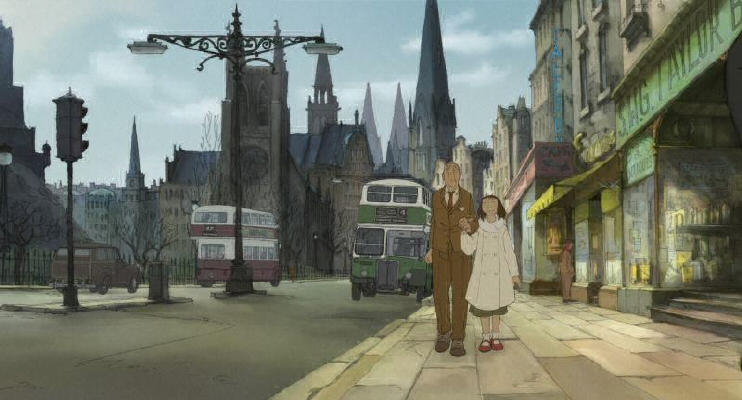
Adapted from an unproduced Jacques Tati screenplay, The Illusionist follows then story of a low-rent magician and his attempts to stay financially afloat doing what he loves. Driving force of plot concerns a teenage girl from a remote Scottish (Irish? Welsh? I can't tell these things.) village whose imagination the titular performer captures; she absconds to the big city with the fellow and if this sounds like a whimsical opportunity for wonder and awe and everyday magic, I have to warn you: this film is a heart-breaking. It's difficult for me to remember the end of the movie without tears welling up in my eyes and I write this as a guy indifferent to the deaths of both Old Yeller and Bambi's mother. Director Sylvain Chomet employs the same dialog-free style as his debut The Triplets of Belleville, but the character of the animation he applies to Tati's script, a luminous streaky water-color-inspired palate, expands the emotional possibilities of his aesthetic. Belleville was bouncy, striking and weird; The Illusionist is colorful, gorgeous and profound. It might be surprising that the comedy is in many ways the least important element of a Tati-derived work, but no doubt about it the humor is merely complementary to a tone that begins wistfully and slumps towards a deep sadness. As the magician becomes increasingly unable to support himself through his chosen profession, he becomes less interested in selling the girl on the magic of the world - the film's understated ending would be impossible to describe as anything other than tragic. That Tati wrote the script as an apology and explanation to his own estranged daughter makes the whole thing crushing. Tati's work has always been dry - many of his biggest laughs coming from miniscule, underplayed bits - but it has never been this heart-rending.
The animation does capture Tati's mannerisms and gives an impression that you are watching the man himself, but the jokes simply aren't as effective in animated form: physical comedy requires physicality to work. There are gags scattered throughout the movie that kill, but the set-pieces are generally amusing and imaginative more than gut-busting. Also, there's nothing impressive about animated magic tricks. So that loses some punch. Still, the rich, delicate images have a naturally evocative quality that blends quite engagingly with the charming, deadpan humor: the film mesmerizes; it doesn't bowl you over with gags and guffaws and ooh's and ah's. The moody style has the effect of drawing out the emotional implications of every joke, whether when the magician worries his pet rabbit has ended up in the girl's rabbit soup or when he humiliates himself in a pink tuxedo as part of living display in a department store window. It's the story of a character, not a compendium of jokes - something one would be hard-pressed to say about any of the Hulot films or his extravagantly imaginative cinematic contraptions Playtime and Traffic. The film's dominant themes are that selling the wonder of magic is still selling something and that lies to yourself and others are a part of any sale; it's dark and cynical stuff for a man who made his name from such sales - it's to Chomet's great credit that he doesn't shy from the difficult emotions and ideas driving the story. If anything, the muted nature of the comedy accentuates the pathos; I can forgive anyone who goes into the film thinking that a Tati-scripted work will primarily be, you know, funny. With his second film, Chomet has taken the script of a beloved, canonized artist and created an artwork of in surprisingly distinctive voice - improbably, The Illusionist speaks in a voice that few would indentify as more Tati's than Chomet's. Here is something I think about The Illusionist that I could not say about any of Tati's work: it is one of the most powerful films I have ever seen.
BLUEBEARD.
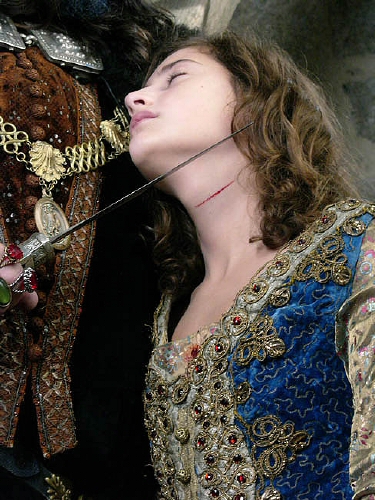
Made for French television, Catherine Breillat's adaptation of Charles Perrault's classic Fairy Tale is a film so modest that it could be easily crushed under the weight of excessive compliments. But in its own small way, this is a brilliant film and one of the purest distillations of L'eau de Breillat possible. It's hard to imagine a film that more clearly and effectively articulates the ideas and emotions around which the French provocateur has been working her whole career: the visual simplicity and blunt plot afford her so much room to tease out the elements which capture her imagination. A simple story: a young woman marries a notorious Lord and discovers his cellar of murdered wives; but a story effortlessly embellished to Breillat's exacting specifications: a barely adolescent woman who doubts her beauty uses her budding sexuality to seduce a notorious Lord, but she unleashes the dark forces within him - he tempts her to open his cellar and discover the corpses of those who came before. Even the dubious framing device of two young girls telling each other the story of Bluebeard (necessary only in the sense that without the scenes the slim film would not reach feature length run-time of 80 minutes) allows Breillat the opportunity for her traditional sororicidal ending. Of course, cinema's most notoriously twisted feminist finds herself right out home in literature's most traditional and lasting source of twisted feminism: the fairy tale. Frequently told from the perspective of women, stories like Sleeping Beauty, Cinderella, Bluebeard, Little Red Riding Hood and The Robber Bridegroom not only offer one of the richest literary sources of the female heroes, but also minimize their male characters to the level of after-thought or symbols: it's one of the few that few aesthetic styles of which this is essentially true - the women are center stage and the men are almost beside the point. Fairy tales are stories about women, their anxieties, their understanding of the world, metaphoric explorations of their sexuality and symbolic deconstructions of their psyche. The titular Bluebeard is not the subject of the movie, but an object that exists only in relation to the story's adolescent protagonist. That these stories feature a darkness, malevolence and violence that reconciles fear and desire in striking, often shocking, ways means that they are Breillat's rightful intellectual property.
But it would be a mistake to suggest that this film offers the same emotional extravagance and cinematic fantasia of Breillat's best films, Fat Girl and The Last Mistress. The film's smallness and quiet demeanor stretch the tone in the opposite direction; instead of emotional brute force exploding on the screen and all around us, Breillat uses this simplicity to achieve a laser focus, a fine precision with which she ineffably burns her message into our mind. Silence is the most dominant element of the film (save perhaps sexualized tension - this is Breillat, after all:) minutes of screentime pass with scarcely a noise beyond the scuffling of shoes on stone floors or the clicking of rings against goblets. Breillat takes us to more and more quiet spaces, lowers the intensity of the flames on burner, forces the inevitable sex and violence to simmer, allowing it to boil over for only the briefest of moments. Breillat's weapon of choice and the nail in our coffins is the film's magnetic and raw lead actress, Lola Créton. As with every Breillat film, you almost don't want to mention the underage actors because you feel like you could go to jail for it and with Créton, as the perfect embodiment of adolescence's intersection of sexual potency and innocence, it's exactly those borderline illegal elements that Breillat wields so powerfully. It is probably Breillat's most radical gesture to portray Créton's character as sexually powerful, manipulative and ultimately victorious - this combination of actress, director and theme will certainly cause the most moral anxiety, if not panic, in audiences. Breillat's obsession with a young woman's desire to feel beautiful and the function of sexuality in satisfying that desire naturally contains fairy tale-ish overtones - you can see it even in a movie like A Very Young Girl. Bluebeard, as Breillat sees the story, further draws out the association between the desire to be powerful and the power found in beauty. That sex awakens a dark, annihilating force in men is nothing new to Breillat; Bluebeard's variation on the idea follows that a strong and intelligent young woman can weather this storm and have his head on a platter when all is said and done. I have a hard time not believing Breillat and Créton when they tell me this.
(continues on next page with a few more FAVORITES and some films that were NOT MASTERPIECES)
<<Previous Page 1 2 3 Next Page>>
home about contact us featured writings years in review film productions
All rights reserved The Pink Smoke © 2011